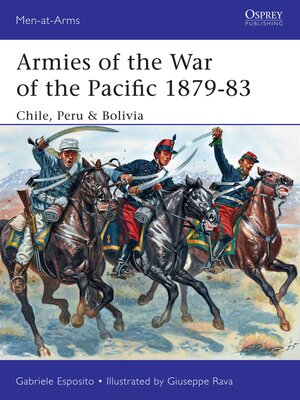Armies of the War of the Pacific 1879–83
ebook ∣ Chile, Peru & Bolivia · Men-at-Arms
By Gabriele Esposito

Sign up to save your library
With an OverDrive account, you can save your favorite libraries for at-a-glance information about availability. Find out more about OverDrive accounts.
Find this title in Libby, the library reading app by OverDrive.



Search for a digital library with this title
Title found at these libraries:
| Library Name | Distance |
|---|---|
| Loading... |
The Pacific War was the greatest and bloodiest war ever fought in the Andean region, and is one of the most important conflicts in South American history.
It is also known as the 'Saltpeter War' or the 'Guano War' because the possession of these two highly profitable nitrates was the main cause of the conflict. By the 1870s Chilean military superiority and expansionist policies exploded into full scale conflict. This book examines the troops, uniforms and equipment used by the Chilean, Peruvian and Bolivian forces and traces the events of the war from the early naval blockades, through major pitched battles, to the final guerilla campaign in occupied Peru.
The war ended in total victory for Chile, and that country's military emergence thereafter as 'the Prussia of South America', while it cost Peru some lucrative provinces, and Bolivia its outlet to the Pacific coast.
It is also known as the 'Saltpeter War' or the 'Guano War' because the possession of these two highly profitable nitrates was the main cause of the conflict. By the 1870s Chilean military superiority and expansionist policies exploded into full scale conflict. This book examines the troops, uniforms and equipment used by the Chilean, Peruvian and Bolivian forces and traces the events of the war from the early naval blockades, through major pitched battles, to the final guerilla campaign in occupied Peru.
The war ended in total victory for Chile, and that country's military emergence thereafter as 'the Prussia of South America', while it cost Peru some lucrative provinces, and Bolivia its outlet to the Pacific coast.







